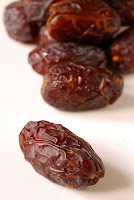 You often say that "sugar is sugar" when talking about calories from white sugar, brown sugar, or evaporated cane juice.
You often say that "sugar is sugar" when talking about calories from white sugar, brown sugar, or evaporated cane juice. But then you point out that a Lara bar is a healthy snack choice because it has no added sugar.
They are made with dates, though, which have sugar.
So if "sugar is sugar," why don't you say that a Lara bar is essentially the same thing as a Snickers?
-- Raymond (last name withheld)
Brooklyn, NY
The three sweeteners you mention in your first sentence are commonly referred to as "empty calories."
This means they contribute nothing but calories to our diets. There are no "redeeming qualities" to them. Not only do they not offer a single vitamin or mineral, they also don't do anything in the way of satiety.
That is precisely why 600-calories of soda don't fill you up anywhere near as much as 600 calories of a meal containing some fat, protein, and fiber.
(Slight tangent: a semi-exception can be made for pure maple syrup in the 'mineral' category, since a single tablespoon provides a third of the daily value of manganese.)
In any case, snack bars made with dates -- such as Lara -- are different from bars that tack on extra calories via a sweetener.
The dates in these bars contribute naturally-occurring sugars which co-exist with potassium, fiber, and many phytochemicals and antioxidants in that fruit.
While brown sugar and white sugar are identical from a nutritional standpoint, those two sugars are nutritionally inferior to fresh or dry fruit.
Hence, a Lara bar and a Snickers bar are worlds apart.
The Snickers bar gets a large portion of its calories from sugar and certainly does not provide the same amount of potassium, fiber, or phytochemicals as its date-based counterpart.
This is why I would love food labels to differentiate between naturally occurring versus added sugars.
A Lara bar might seem to have almost as much sugar as a Snickers bar, but we are talking about two very different sources of sweetness.





3 comments:
"Not only do they not offer a single vitamin or mineral, they also don't do anything in the way of satiety."
The lack of vitamins does not equal lack of satiety. Sugar doesn't offer satiety, because it is combined with other foods. The relation between sugar and weight is very complex. Granulated sugar by itself has very little fattening power, esp for animals given a self-selection diet, i.e they choose their macro-nutrient ratios, rather than being fed lab chow. Here are two studies demonstrating this point.
Dietary obesity: Differential effects with self-selection and composite diet feeding techniques
Dietary self-selection vs. complete diet: body weight gain and meal pattern in rats
It is also clear from anecdotal evidence that nobody gets fat from eating refined sugar in the absence of other food. Seth Roberts presents other studies making it clear that dry sugar eaten by itself has very little power to cause weight gain & you have to put the blame on other foods in the diet. No single food can be fully blamed for obesity, because I doubt that anybody eats sugar dry from the bowl, or pure oils without sugars or starch, etc. Most people mix foods together, and that creates complex interactions.
What Makes Food Fattening? A Pavlovian Theory of Weight Control
Bruce, you completely misunderstood this post.
The point I am making here is NOT that vitamins provide satiety (they obviously do not, since they do not contain calories).
What I am referring to is that since sweeteners lack protein, fat, and fiber, they do not promote satiety.
That is why 600 calories of Coke are nowhere near as satiating as 150 calories of almonds (which contain protein, fat, and fiber).
If you take some time to read the rest of my blog, you will see that at no point do I float around the theory that "sugar makes you fat."
However, since sweeteners do not do much of anything as far as satiety is concerned, liquid calories from sugar (ie: soda, fruit juice, etc.) simply tack on hundreds of extra calories to most people's days.
But certain foods stimulate appetite and others don't. It will be hard to get fat eating a diet with fruit and 100% juices as the ONLY source of carbs just like it would be hard to get fat eating sugar by itself with no other food. Natural sugar is an entirely different matter, and you are right to point that out. People who claim "fructose is evil" are basing this argument on flawed studies using refined sugars and lab chow diets, not real food and/or self-selection diets. An apple is not the same as high fructose corn syrup and people who say it is are crazy.
Post a Comment